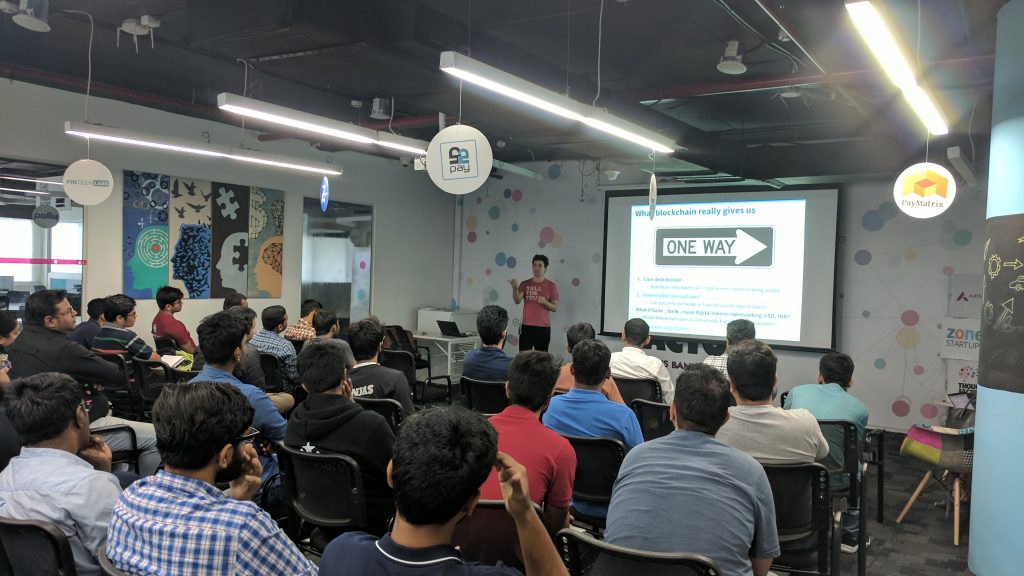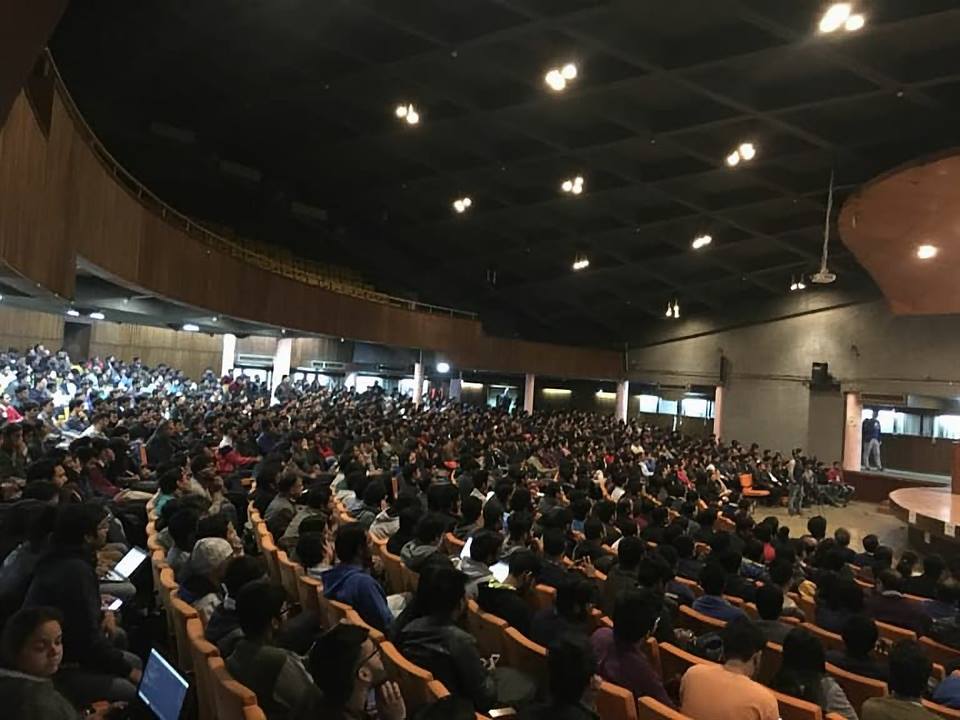In March 2019, cryptocurrency enthusiasts and experts across India will make their voices heard at a nationwide roadshow. They intend to draw up a joint report which will be handed to the Indian government in lieu of the upcoming release of a crypto regulation framework.
Also read: Indian Supreme Court Gives Government 4 Weeks to Produce Crypto Regulation
4 Cities, 1 Month, 1000s of Cryptocurrency Enthusiasts
The campaign, organised by one of India’s foremost blockchain communities, will see open town halls in four cities across the country throughout the month of March for India’s cryptocurrency community to come together and have their say. National open town halls will be held in the four major blockchain cities where Blockchained India has chapters: Delhi on March 2, Mumbai on March 9, Hyderabad on March 16, and Bangalore on March 30.
Having been on the road for the last four months preparing for the upcoming India Dapp Fest in May 2019, the team has had a chance to interact closely with the country’s widespread crypto and blockchain community. Akshay Aggarwal, co-founder and country head of Blockchained India, spoke to news.Bitcoin.com about what they hope to gain from this campaign, saying:
We have found Delhi and Bangalore to be the most mature ecosystems. The enthusiasm, especially in Delhi, is another level altogether. Though when you look specifically at enterprise blockchains, Hyderabad comes quite close to Bangalore. This is due to the initiative of the Telangana government to form a blockchain district.
According to Aggarwal, they’ve received extensive interest in the events, and 30-40 companies have signed up as speakers. He anticipates a total of 1,800-2,000 people participating in the four events, flying in from all across the country.
He highlights that while some entrepreneurs are traveling to their closest participating city especially for this purpose, ecosystem members who are unable to join physically are emailing Blockchained India their insights to be included in the report that will be submitted to governmental decision-makers.

The roadshows aim to offer unbiased information around the developments that have happened in the cryptocurrency space to date, as well as expert opinions on the reason behind those developments, covering both positive and negative aspects of the Indian industry landscape.
This, says Aggarwal, will be followed by a round of stakeholder views on a probable state of policy that will foster innovation and entrepreneurship and help the Indian economy by capturing value generated by the unique paradigm shift that this industry demands. A Q&A session with experts on hand will allow participants to address their most pertinent questions and queries.
The events, thus, will offer full-bodied coverage of topics pertinent to the upcoming governmental policymaking.
The Aim of the Roadshow
Aggarwal notes that since July 6, 2018, when India’s ban on cryptocurrency exchanges came into effect, he has seen many entrepreneurs within the Indian community move base to countries where regulations towards cryptocurrencies are favorable.
At first, he thought that Blockchained India would assist startup founders to set up shop by helping to smooth the process, but soon realised that very few of them could afford the cost associated with such a step — that too at an early stage where founders are already struggling to build startups.
Their vision at Blockchained India, he explains, has always been to encourage India’s blockchain and crypto developers and entrepreneurs to help bear the burden of innovation that has been dominated by the West for the last few hundred years.

Armed with the mission to make India a blockchain hub, Aggarwal realised that skills development and knowledge sharing isn’t enough. To achieve such lofty ideals, the sub-continent also requires encouraging policies and infrastructural support. While Blockchained India was already catering to the former two, they were falling shy of their goal because of the lack of positive national regulations.
Hence the roadshow, which seemed to be the right next step, and pressure from the Supreme Court to force the government into action made the community respond in post haste.
Community Activism Such as This Will Make or Break the Indian Crypto Landscape
Aggarwal feels that exposure to a triad comprising skills development, knowledge sharing, and government-friendly policies and infrastructural support is “super necessary.” He singles out knowledge sharing sessions conducted in the form of community events, since these “help one to understand things by channeling the wisdom of the crowd.”
It is only by sharing expertise, he muses, that the community can go about progressing as rapidly as the industry requires for it to succeed. Over and above the regulatory mishap – currently the biggest piece of contention in India’s crypto scene – he adds that there are also scalability, security, and user experience problems to deal with. All of these need to be solved collectively before cryptocurrency and blockchain can be ready for mainstream adoption. Aggarwal opines:
I feel this is just a start. We are taking individual steps for the ecosystem to move in the right direction, but at the same time, these positive initiatives encourage other members of the ecosystem to take action for themselves. Cumulatively, we’ll end up pushing the whole ecosystem by miles.
Communal Efforts to Affect Policy-Making Will Pay Off
Efforts like these, together with the #indiawantscrypto campaign, enable India’s cryptocurrency community to gather supporters and influence the regulatory environment. Aggarwal believes that though it’ll take time, these efforts will ultimately have a sizeable impact on official decision-making.
This is crucial to prevent the industry brain drain caused by the government’s totalitarian position on cryptocurrencies. Though the financial impact of founders leaving the country for more positive regulatory waters hasn’t been significant thus far, Aggarwal reminds that this is primarily due to the fact that because of the government’s animosity, cryptocurrency innovation has been stilted.
The ecosystem cash flow that has been generated has mostly left the country, preventing the local industry from involving India’s top minds or fostering a culture of innovation. He reiterates that the entire movement has taken a massive hit in terms of numbers, enthusiasm, and the collective impact of the number of innovators multiplied by the velocity of the pace at which they could be innovating.

He’s hopeful that their efforts will pay off, stating that if the government continues to be pressurized to lift its clampdown, positive changes are bound to follow.
Should the Supreme Court’s decision in the next few weeks not be in the crypto community’s favor, Aggarwal encourages them to stand together and request at least a pilot jurisdiction to test what effect cryptocurrencies will have on the country’s economy. He applauds the government for being “quite progressive” in that some states have already initiated game-changing initiatives, but stresses that the community will play a crucial role in “helping the government see what they’re unable to.”
He opines that, if nothing else, a pilot will be far more efficient at evaluating the impact of cryptocurrencies at a macroeconomic level than to continue making vague, unsubstantiated guesses.
We might end up achieving something evolutionary for all of humanity and not just for ourselves as a country.
Do you think this campaign will have a positive impact on the Indian government’s stance on crypto? Let us know in the comments section below!
Images courtesy of Shutterstock and Blockchained India.
Need to calculate your bitcoin holdings? Check our tools section.
The post Indian Crypto Community Rallies to Influence Government’s Decision on Cryptocurrency Regulation appeared first on Bitcoin News.










